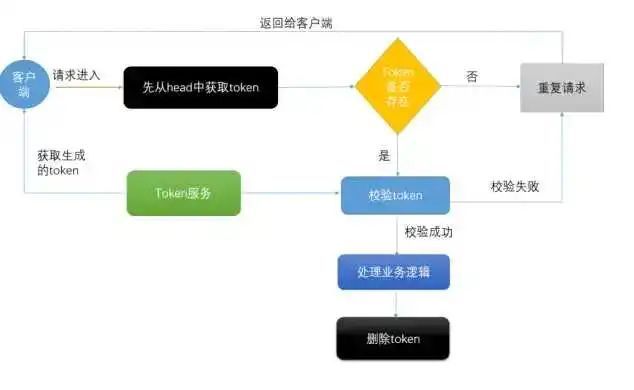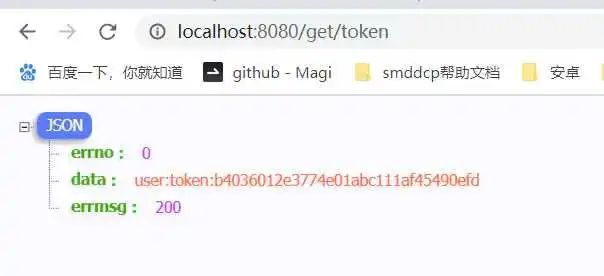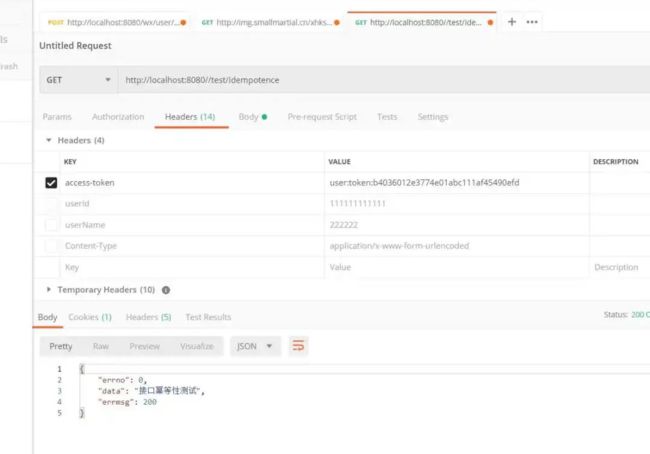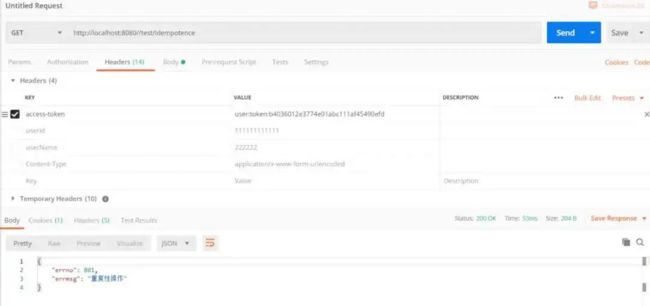介绍
幂等性的概念是,任意多次执行所产生的影响都与一次执行产生的影响相同,按照这个含义,最终的解释是对数据库的影响只能是一次性的,不能重复处理。手段如下
数据库建立唯一索引
token机制
悲观锁或者是乐观锁
先查询后判断
小小主要带你们介绍Redis实现自动幂等性。其原理如下图所示。
实现过程
引入 maven 依赖
org.springframework.boot
spring-boot-starter-data-redis
spring 配置文件写入
server.port=8080
core.datasource.druid.enabled=true
core.datasource.druid.url=jdbc:mysql://192.168.1.225:3306/?useUnicode=true&characterEncoding=UTF-8
core.datasource.druid.username=root
core.datasource.druid.password=
core.redis.enabled=true
spring.redis.host=192.168.1.225 #本机的redis地址
spring.redis.port=16379
spring.redis.database=3
spring.redis.jedis.pool.max-active=10
spring.redis.jedis.pool.max-idle=10
spring.redis.jedis.pool.max-wait=5s
spring.redis.jedis.pool.min-idle=10
引入 Redis
引入 Spring boot 中的redis相关的stater,后面需要用到 Spring Boot 封装好的 RedisTemplate
package cn.smallmartial.demo.utils;
import org.springframework.beans.factory.annotation.Autowired;
import org.springframework.data.redis.core.RedisTemplate;
import org.springframework.data.redis.core.ValueOperations;
import org.springframework.stereotype.Component;
import java.io.Serializable;
import java.util.Objects;
import java.util.concurrent.TimeUnit;
/**
* @Author smallmartial
* @Date 2020/4/16
* @Email [email protected]
*/
@Component
public class RedisUtil {
@Autowired
private RedisTemplate redisTemplate;
/**
* 写入缓存
*
* @param key
* @param value
* @return
*/
public boolean set(final String key, Object value) {
boolean result = false;
try {
ValueOperations operations = redisTemplate.opsForValue();
operations.set(key, value);
result = true;
} catch (Exception e) {
e.printStackTrace();
}
return result;
}
/**
* 写入缓存设置时间
*
* @param key
* @param value
* @param expireTime
* @return
*/
public boolean setEx(final String key, Object value, long expireTime) {
boolean result = false;
try {
ValueOperations operations = redisTemplate.opsForValue();
operations.set(key, value);
redisTemplate.expire(key, expireTime, TimeUnit.SECONDS);
result = true;
} catch (Exception e) {
e.printStackTrace();
}
return result;
}
/**
* 读取缓存
*
* @param key
* @return
*/
public Object get(final String key) {
Object result = null;
ValueOperations operations = redisTemplate.opsForValue();
result = operations.get(key);
return result;
}
/**
* 删除对应的value
*
* @param key
*/
public boolean remove(final String key) {
if (exists(key)) {
Boolean delete = redisTemplate.delete(key);
return delete;
}
return false;
}
/**
* 判断key是否存在
*
* @param key
* @return
*/
public boolean exists(final String key) {
boolean result = false;
ValueOperations operations = redisTemplate.opsForValue();
if (Objects.nonNull(operations.get(key))) {
result = true;
}
return result;
}
}
自定义注解
自定义一个注解,定义此注解的目的是把它添加到需要实现幂等的方法上,只要某个方法注解了其,都会自动实现幂等操作。其代码如下
@Target({ElementType.METHOD})
@Retention(RetentionPolicy.RUNTIME)
public @interface AutoIdempotent {
}
token 的创建和实现
token 服务接口,我们新建一个接口,创建token服务,里面主要是有两个方法,一个用来创建 token,一个用来验证token
public interface TokenService {
/**
* 创建token
* @return
*/
public String createToken();
/**
* 检验token
* @param request
* @return
*/
public boolean checkToken(HttpServletRequest request) throws Exception;
}
token 的实现类,token中引用了服务的实现类,token引用了 redis 服务,创建token采用随机算法工具类生成随机 uuid 字符串,然后放入 redis 中,如果放入成功,返回token,校验方法就是从 header 中获取 token 的值,如果不存在,直接跑出异常,这个异常信息可以被直接拦截到,返回给前端。
package cn.smallmartial.demo.service.impl;
import cn.smallmartial.demo.bean.RedisKeyPrefix;
import cn.smallmartial.demo.bean.ResponseCode;
import cn.smallmartial.demo.exception.ApiResult;
import cn.smallmartial.demo.exception.BusinessException;
import cn.smallmartial.demo.service.TokenService;
import cn.smallmartial.demo.utils.RedisUtil;
import io.netty.util.internal.StringUtil;
import org.springframework.beans.factory.annotation.Autowired;
import org.springframework.stereotype.Service;
import org.springframework.util.StringUtils;
import javax.servlet.http.HttpServletRequest;
import java.util.Random;
import java.util.UUID;
/**
* @Author smallmartial
* @Date 2020/4/16
* @Email [email protected]
*/
@Service
public class TokenServiceImpl implements TokenService {
@Autowired
private RedisUtil redisService;
/**
* 创建token
*
* @return
*/
@Override
public String createToken() {
String str = UUID.randomUUID().toString().replace("-", "");
StringBuilder token = new StringBuilder();
try {
token.append(RedisKeyPrefix.TOKEN_PREFIX).append(str);
redisService.setEx(token.toString(), token.toString(), 10000L);
boolean empty = StringUtils.isEmpty(token.toString());
if (!empty) {
return token.toString();
}
} catch (Exception ex) {
ex.printStackTrace();
}
return null;
}
/**
* 检验token
*
* @param request
* @return
*/
@Override
public boolean checkToken(HttpServletRequest request) throws Exception {
String token = request.getHeader(RedisKeyPrefix.TOKEN_NAME);
if (StringUtils.isEmpty(token)) {// header中不存在token
token = request.getParameter(RedisKeyPrefix.TOKEN_NAME);
if (StringUtils.isEmpty(token)) {// parameter中也不存在token
throw new BusinessException(ApiResult.BADARGUMENT);
}
}
if (!redisService.exists(token)) {
throw new BusinessException(ApiResult.REPETITIVE_OPERATION);
}
boolean remove = redisService.remove(token);
if (!remove) {
throw new BusinessException(ApiResult.REPETITIVE_OPERATION);
}
return true;
}
}
拦截器的配置
用于拦截前端的 token,判断前端的 token 是否有效
@Configuration
public class WebMvcConfiguration extends WebMvcConfigurationSupport {
@Bean
public AuthInterceptor authInterceptor() {
return new AuthInterceptor();
}
/**
* 拦截器配置
*
* @param registry
*/
@Override
public void addInterceptors(InterceptorRegistry registry) {
registry.addInterceptor(authInterceptor());
// .addPathPatterns("/ksb/**")
// .excludePathPatterns("/ksb/auth/**", "/api/common/**", "/error", "/api/*");
super.addInterceptors(registry);
}
@Override
public void addResourceHandlers(ResourceHandlerRegistry registry) {
registry.addResourceHandler("/**").addResourceLocations(
"classpath:/static/");
registry.addResourceHandler("swagger-ui.html").addResourceLocations(
"classpath:/META-INF/resources/");
registry.addResourceHandler("/webjars/**").addResourceLocations(
"classpath:/META-INF/resources/webjars/");
super.addResourceHandlers(registry);
}
}
拦截处理器:主要用于拦截扫描到 Autoldempotent 到注解方法,然后调用 tokenService 的 checkToken 方法校验 token 是否正确,如果捕捉到异常就把异常信息渲染成 json 返回给前端。这部分代码主要和自定义注解部分挂钩。其主要代码如下所示
@Slf4j
public class AuthInterceptor extends HandlerInterceptorAdapter {
@Autowired
private TokenService tokenService;
@Override
public boolean preHandle(HttpServletRequest request, HttpServletResponse response, Object handler) throws Exception {
if (!(handler instanceof HandlerMethod)) {
return true;
}
HandlerMethod handlerMethod = (HandlerMethod) handler;
Method method = handlerMethod.getMethod();
//被ApiIdempotment标记的扫描
AutoIdempotent methodAnnotation = method.getAnnotation(AutoIdempotent.class);
if (methodAnnotation != null) {
try {
return tokenService.checkToken(request);// 幂等性校验, 校验通过则放行, 校验失败则抛出异常, 并通过统一异常处理返回友好提示
} catch (Exception ex) {
throw new BusinessException(ApiResult.REPETITIVE_OPERATION);
}
}
return true;
}
}
测试用例
这里进行相关的测试用例 模拟业务请求类,通过相关的路径获得相关的token,然后调用 testidempotence 方法,这个方法注解了 @Autoldempotent,拦截器会拦截所有的请求,当判断到处理的方法上面有该注解的时候,就会调用 TokenService 中的 checkToken() 方法,如果有异常会跑出,代码如下所示
/**
* @Author smallmartial
* @Date 2020/4/16
* @Email [email protected]
*/
@RestController
public class BusinessController {
@Autowired
private TokenService tokenService;
@GetMapping("/get/token")
public Object getToken(){
String token = tokenService.createToken();
return ResponseUtil.ok(token) ;
}
@AutoIdempotent
@GetMapping("/test/Idempotence")
public Object testIdempotence() {
String token = "接口幂等性测试";
return ResponseUtil.ok(token) ;
}
}
用浏览器进行访问
用获取到的token第一次访问
用获取到的token再次访问
可以看到,第二次访问失败,即,幂等性验证通过。
作者:___mySoul
原文链接:https://blog.csdn.net/melovemingming/article/details/109665270



